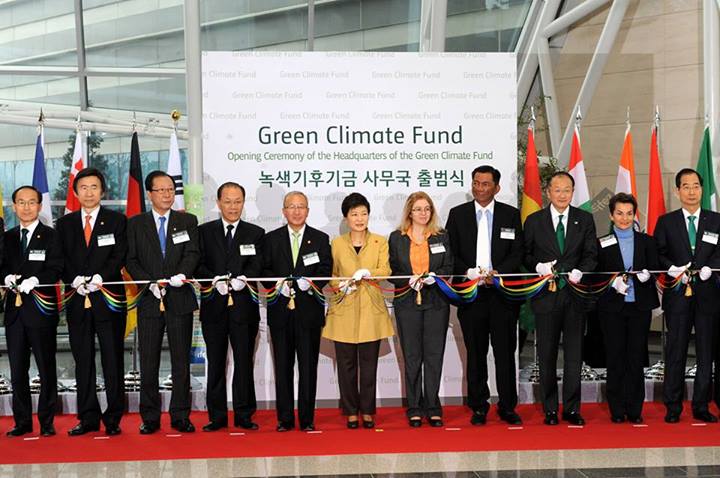
By Atâyi Babs
The United Nations funding initiative, Green Climate Fund (GCF), established by 194 governments to limit or reduce greenhouse gas emissions in developing countries, and to help adapt vulnerable societies to the unavoidable impacts of climate change appears set to accredit HSBC and Crédit Agricole as partners despite strong opposition from civil society groups over the weekend.
In an open letter to the GCF Board, about 88 groups expressed strong objections to the applications by HSBC and Crédit Agricole on the grounds that their accreditation would pose serious reputational and moral risk to the GCF.
These according to the groups, are attributable to the commercial banks’ well-documented involvement in recent money laundering and other fiduciary mismanagement scandals; large exposure to the coal industry and other climate polluting sectors; and poor-quality policies and weak compliance arrangements meant to manage the social, gender, and environmental impacts of their lending, and consequent harm on-the-ground.
With signatories from all regions including the Pan African Climate Justice Alliance, Friend of the Earth International, ActionAid, Heinrich Boll North America and Climate & Sustainable Development Network of Nigeria amongst others, the campaigners further cautioned that the accreditation of HSBC and Crédit Agricole would run contrary to the GCF’s intent to be a game-changing institution with country ownership at its core.
The campaigners are of the view that “GCF Board’s rejection of their applications would be a strong mark in favor of maintaining the integrity of the Fund.”
“The banks’ accreditation would undermine the GCF’s commitment to robust fiduciary standards and strong environmental and social safeguards as well as gender equality, and would be contrary to what the GCF Secretariat has described as having “GCF standards that build on best practices of global institutions,”the letter added.
Like Deutsche Bank, like HSBC and Crédit Agricole
With the GCF declining an official response to the issues raised in the letter, indications from the Fund’s secretariat confirm that HSBC and Crédit Agricole would be duly accredited just as the Deutsche Bank was accredited early July this year amid several protests.
It may be recalled that over 20 groups expressed their disappointment over the accreditation given to Deutsche Bank which according to them, is the world’s 10th largest backer of coal, with €15bn invested in the industry from 2005 to 2014.
They argued that Deutsche Bank’s support for coal was at odds with the green fund’s carbon-cutting objectives and raised concerns over its ”very poor” record on human rights monitoring and failure to crack down on money laundering.
Brandon Wu, senior policy analyst at ActionAid USA and one of two civil society “active observers” on the GCF Board, was one of the signatories of the statement released on the 9th of July 2015.
He said: “The Green Climate Fund is supposed to be a fund for climate action in developing countries, with a particular focus on the poorest and most vulnerable. “For it to partner with one of the largest private-sector coal financiers in the world – and one embroiled in multiple scandals around market manipulation and money laundering – is so far from this vision and mandate that it boggles the mind.”
Fighting climate change by funding coal-fired plants
At a contentious meeting in Songdo, South Korea, March this year, the GCF, set-up primarily to help developing countries fight climate change, affirmed under rules agreed by the board that its funds can be spent on coal-fired power plants, the most polluting form of electricity generation.
Turning down calls for an explicit ban on fossil fuel projects, the green climate fund (GCF) through its Executive Director, Hela Cheikhrouhou responded in a statement that “We are building a vibrant network of partners – which is evidence of a rising demand for an active GCF.”
Perhaps buoyed by the seeming paradox of a fund set up to help developing countries finance clean energy and measures to help adapt to climate change, and at the same time accepting to fund coal-fired plants and accrediting banks that bankroll logging in Malaysia, causing widespread environmental destruction, Japan gleefully announced at the 2014 Lima climate conference in Peru that it was designating $1bn in loans for coal plants in Indonesia as climate finance.
Japan counted another $630m in loans for coal plants in India and Bangladesh as climate finance.
Japan claims the projects are less polluting than older coal-fired plants and so qualify as clean energy. “Japan is of the view that the promotion of high-efficiency coal-fired power plants is one of the realistic, pragmatic and effective approaches to cope with the issue of climate change.”
For Karen Orenstein, a campaigner for Friends of the Earth US “It’s like a torture convention that doesn’t forbid torture.” “Honestly it should be a no-brainer at this point.”
While the GCF continues to flaunt on its newly launched website, the resolve “to promote the paradigm shift towards low-emission and climate-resilient development pathways by providing support to developing countries to limit or reduce their greenhouse gas emissions,” the disconnect between the fund’s objectives and its actions widens by the day, fueling speculations that the fund may have been programmed to fail.











